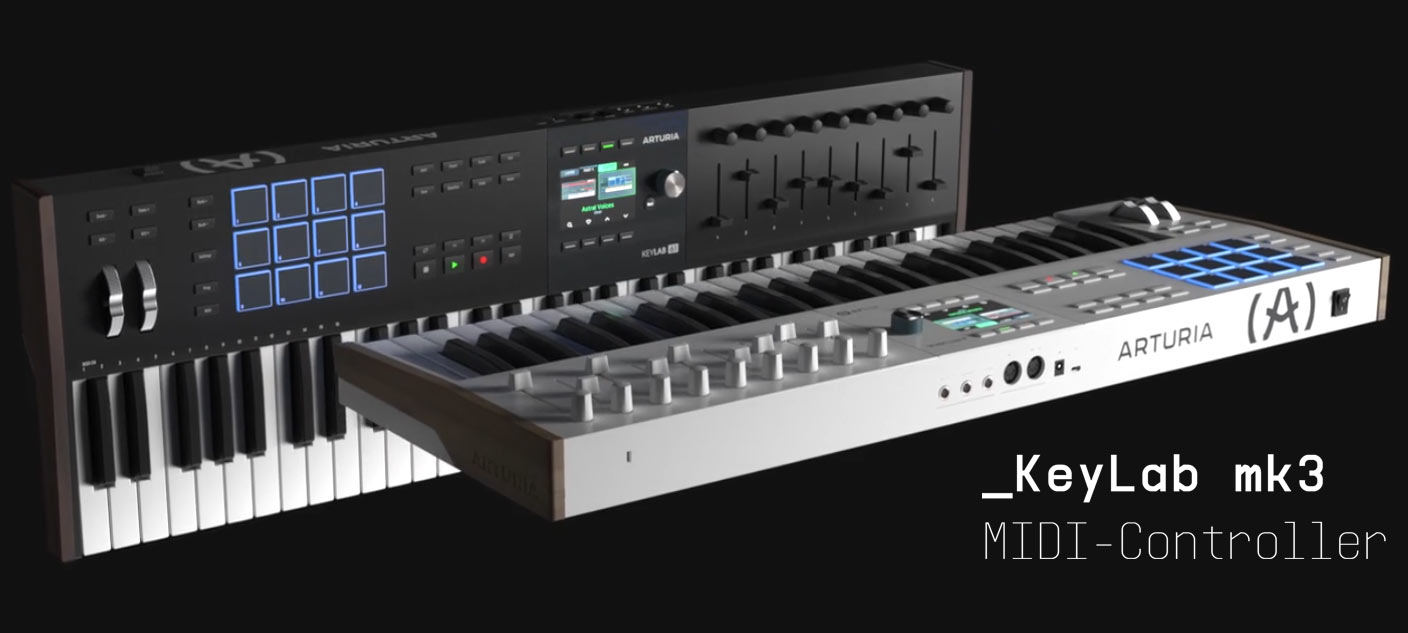
Comparison: Arturia KeyLab MKIII - 49, 61 and 88 keys at a glance
The KeyLab MKIII series from Arturia is one of the most advanced and versatile MIDI controllers on the market. With variants in 49, 61 and 88 keys, Arturia is aimed at ambitious beginners as well as professional musicians and producers. In this comparison, we take a look at the differences and similarities between the three models in terms of feel, range of functions, workmanship and range of applications.
Technical comparison table
| Characteristic | KeyLab 49 MKIII | KeyLab 61 MKIII | KeyLab 88 MKIII |
|---|---|---|---|
| Keyboard | 49 semi-weighted keys with aftertouch | 61 semi-weighted keys with aftertouch | 88 weighted hammer action (Fatar TP/110) with aftertouch |
| Controls | 9 encoders, 9 faders, 12 pads (4 banks) | 9 encoders, 9 faders, 12 pads (4 banks) | 9 encoders, 9 faders, 12 pads (4 banks) |
| Display | 3.5" color display (320 x 480 px) with 8 context-sensitive buttons | ||
| DAW control | MCU/HUI, transport control, MIDI mapping, scale, arpeggio and chord mode | ||
| Pedal connections | Sustain, expression, aux | ||
| Connections | USB-C, MIDI in/out, NKS compatible | ||
| Materials | Robust aluminum housing with wooden side panels | ||
| weight | 6.1 kg | 6.8 kg | 15.7 kg |
| Dimensions (WxDxH) | 787 x 280 x 72 mm | 873 x 278 x 74 mm | 1316 x 352 x 127 mm |
| Software bundle | Analog Lab Pro, Augmented Strings, Piano V, Ableton Live Lite, NI The Gentleman, Loopcloud, Melodics and much more. | ||
Playing feel and keyboard quality
All three models offer a very precise, expressive playing feel - adapted to the respective application. The versions with 49 and 61 keys rely on semi-weighted keys with aftertouch, which enable pleasant, smooth playing. The 88-key version, on the other hand, integrates a fully weighted hammer action from Fatar (TP/110), which is particularly appealing to pianists. It offers a realistic piano feel, ideal for expressive performances.
Control options and creative tools
Regardless of the number of keys, all models offer the same comprehensive control over software and hardware instruments: 9 encoders, 9 faders, 12 velocity- and pressure-sensitive pads (with 4 pad banks), as well as an intuitive 3.5-inch color display with 8 soft buttons. Features such as scale mode, arpeggiator and chord mode enable musical experimentation and creative freedom at the highest level.
DAW integration and software
The KeyLab MKIII series is perfectly tailored to DAW users. Thanks to MCU and HUI compatibility, DAWs such as Ableton Live, FL Studio, Logic Pro, Cubase and Bitwig Studio can be controlled directly. In addition, all models come with a comprehensive software package, including Analog Lab Pro, Piano V, NI The Gentleman, Loopcloud and more. The integration of Native Instruments Komplete Select and NKS support is also part of the range of functions - a real highlight for hybrid setups.
Connections and compatibility
Connectivity is crucial for live performers and studio users alike. All three models have MIDI in/out, USB-C and pedal inputs (sustain, expression, auxiliary). The 88 version also offers additional connectivity such as CV/Gate for modular setups - ideal for professional applications.
Workmanship and design
The enclosures of the KeyLab MKIII series are made of robust aluminum with wooden side panels - stylish, stable and durable. The build quality is consistently high, and the weight increases accordingly with the number of keys. While the 49-key model is quite portable at 6.1 kg, the 88-key version weighs an impressive 15.7 kg and is primarily suitable for stationary use or for stage professionals with the appropriate equipment.
Software package and scope of delivery
The included software package is impressive across the board. In addition to the tried-and-tested Analog Lab Pro software, other high-quality instruments and effects are also included. Particularly noteworthy is the support for NKS (Native Kontrol Standard), which allows over 2,000 compatible instruments to be controlled seamlessly - preset browsing, parameter access and automation included. The 61 and 88-key versions also come with additional accessories such as a music stand or computer holder.
Which model is suitable for whom?
- KeyLab 49 MKIII: Ideal for mobile producers who want compact dimensions, low weight and yet comprehensive control.
- KeyLab 61 MKIII: The perfect balance between portability and scope. The additional octave offers more flexibility, but is still easy to transport.
- KeyLab 88 MKIII: The choice for pianists, composers and studios looking for a real piano feel and maximum control.
Conclusion
The Arturia KeyLab MKIII series impresses with a well thought-out overall concept: excellent playing feel, intuitive operation, comprehensive DAW control and high-quality workmanship. The differences lie primarily in the keyboard mechanics, size, weight and variety of connections. Whether as a compact solution in the home studio, a versatile all-rounder or a powerful professional controller with 88 keys - every musician will find the right tool here.






